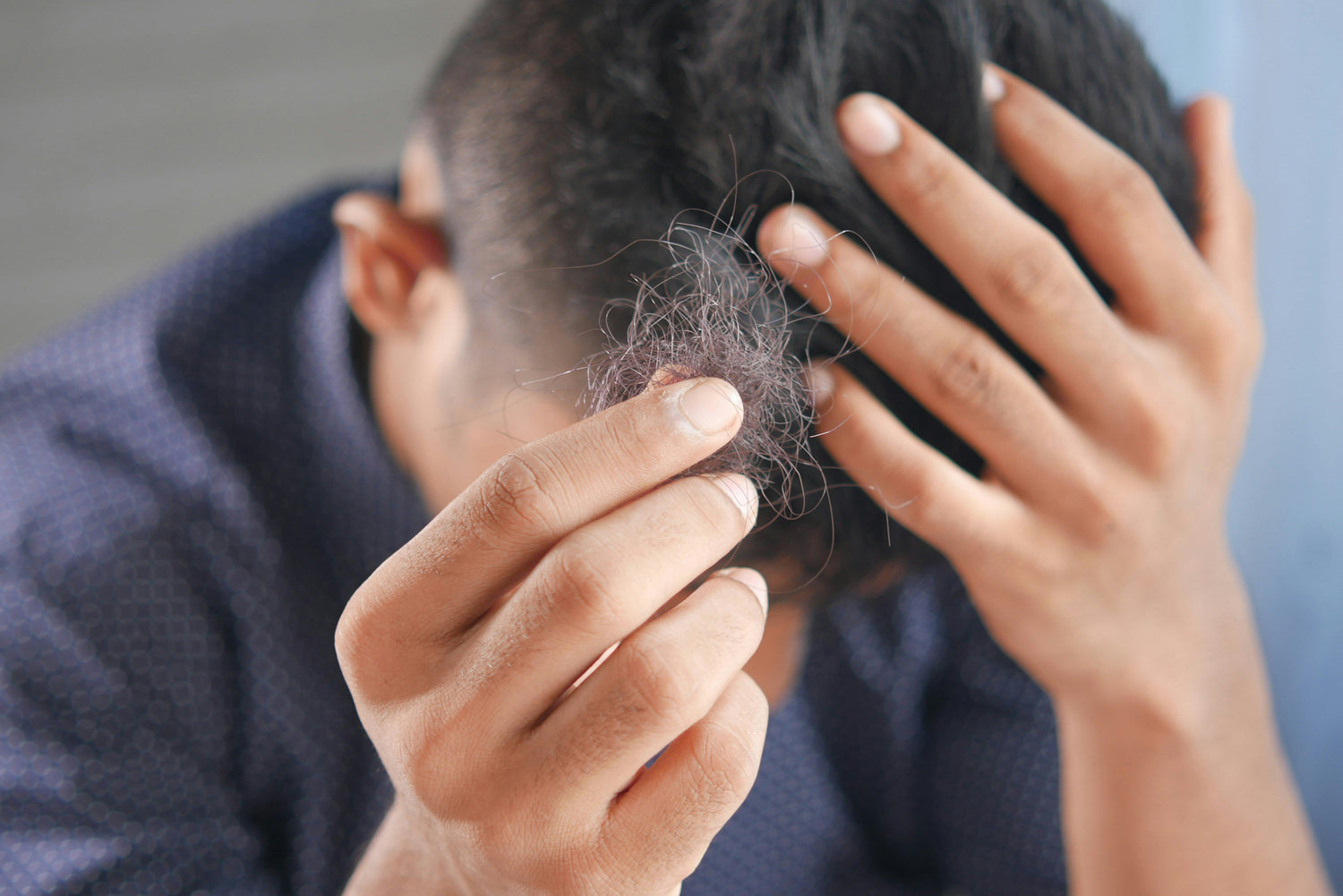Bald may look cool, but let’s be honest, when you notice your receding hairline, you don’t feel like a movie star. Low self-esteem and dating issues, this list can go on.
According to the American Hair Loss Association, 2/3 of men will experience some degree of hair loss by the age of 35. So, if you notice more hair shedding than usual, this might be a sign that you should start paying more attention to your hair.
There’s no one specific reason why men go bald. It’s usually a combination of several factors. Let’s explore the four main reasons associated with male baldness.

Real-life example of a 25-year-old male with genetic hair loss: check full discussion.
Genetics and Hair Loss
If your father and grandfather were bold or had receding hairlines, there’s a high chance that you’ll have it too when you reach a certain age. Hereditary hair loss is the most common type of hair loss in men, affecting up to 50% of men by the age of 50. It’s also called androgenetic alopecia or male-pattern baldness.
There’s a special baldness gene that’s responsible for hair loss. It usually comes from both parents and determines the child’s sensitivity to dihydrotestosterone (DHT). If you’re too sensitive to it, this hormone affects the normal cycle of your hair growth. As a result, you have shorter and thinner hair, which then leads to pattern baldness.
Hair loss usually starts at the crown or hairline and gradually spreads. Below you can see the 6 stages of hair loss.

Genetic hair loss has a very high psychological impact on people. When baldness “runs in the family” and they know it’s inevitable, it causes distress and panic when they see the first signs. Negative self-perception and low self-esteem may affect how these people socialize and find their place in the community.
How Lifestyle Affects Hair Loss
While genetic predisposition plays a major role in baldness, there are many other factors that affect how and when the hair loss will start. One of those factors is lifestyle.
Stress, pollution, and the quality of food affect your body. They cause changes that lead to different health issues, including hair loss.
According to research, high levels of cortisol, the stress hormone, can affect hair growth cycles, leading to hair shedding. Chronic stress has become a big part of modern life. Long work hours, money issues, and too much time on our screens affect our well-being. Reducing stress levels and improving sleep can help support healthy hair growth.

Real-life example of hair loss due to stress: check full discussion.
A lack of time and energy to prepare a healthy meal makes many people eat junk food and quick snacks. Because of these unhealthy eating habits, we don’t get the important nutrients needed for healthy hair growth. Smoking and having too much alcohol can also affect your hair.
A study showed that deficiencies in nutrients such as iron, zinc, vitamin D, and fatty acids can increase shedding and thinning.
Among other things that can damage your hair are air pollution, hard water, and chlorine. Overusing strong chemical treatments and harsh shampoos can also stress out your hair and scalp.
It’s really important to take care of your hair and scalp. Trying out scalp treatment products with antioxidants might help you reduce the damage. But you should be careful, because some modern haircare habits might be doing more harm than good. Pay attention to what you use on your hair.
Skin and Scalp Conditions
If you feel itchiness, pain, and even have scaly patches alongside hair shedding, you might have a scalp infection.
Infections and various skin conditions can also cause hair loss. Each condition comes with specific symptoms that may not be directly related to the scalp. If you notice any unusual symptoms, talk to a dermatologist as soon as you can.
Folliculitis, dermatitis, psoriasis, and impetigo are some of the most common ones.

Real-life example of hair loss caused by psoriasis: check full discussion.
Unlike other hair loss causes, you can avoid getting scalp infections if you follow some basic hygiene rules:
-
Don’t share personal items like combs and hats.
-
Don’t irritate your scalp by using too many chemical products.
-
Wash your hair regularly with a gentle shampoo.
But if it’s too late, follow your doctor's instructions to treat the infection and regrow your hair.
Medications and Therapies
Multiple studies have shown that certain medications and therapies affect your hair growth cycle and cause hair loss. It usually happens gradually, instead of patches like in male-pattern baldness. You can start losing hair up to 4 months after taking the medications. This is why many people don’t often see a connection.
Telogen effluvium is the common type of hair loss in this case. It pushes your hair roots into a resting state, and they begin to fall out within several months.
Hair loss caused by meds is usually temporary and can be treated after you stop taking those drugs or finish your treatment. Sometimes, your hair grows back on its own, but in most cases, you should use some haircare products and FDA-approved medications.
Truth or a Myth?
Myth 1: Hair treatment products don’t work.
Hair restoration products work if you use them consistently over a long period of time. These products give you a cosmetic treatment. The results may not be permanent if you don’t treat the cause of your hair loss.
Myth 2: Styling products don’t cause hair loss.
Chemical products you use for styling can damage your hair follicles. So, if you use too much hair gel, you should probably stop.
Myth 3: Bald men have too much testosterone.
Hormones can cause baldness in men. But it’s not directly connected to the amount of testosterone in your body, especially too much of it.
Myth 4: Washing hair every day causes hair loss.
This is false. You should wash your hair regularly to keep your scalp healthy. Not washing hair for a long time can cause buildups or scalp conditions.

Real-life example of fighting against scalp buildup: check full discussion.
To Sum Up
Why do men get bald? There’s no specific answer. It depends on genetics, hormones, and lifestyle choices. Some hair loss types are permanent, but in other cases, you can grow your hair back.
Hair loss shouldn’t control your confidence and affect your life. Thousands of men are going through it at different stages. If you’ve just noticed shedding hair, you can find solutions to prevent and delay baldness.
Try-Spartan offers a wide range of targeted hair care products:
-
The Root Activator Shampoo cleanses and nourishes the scalp.
-
The Root Activator Conditioner strengthens strands and reduces damage.
-
Root Activator Soap Bar provides a natural cleansing option.
-
Spray For Hair Loss nurtures the scalp, supporting healthier follicle growth.
Visit our shop for more hair care products that fit your needs.



